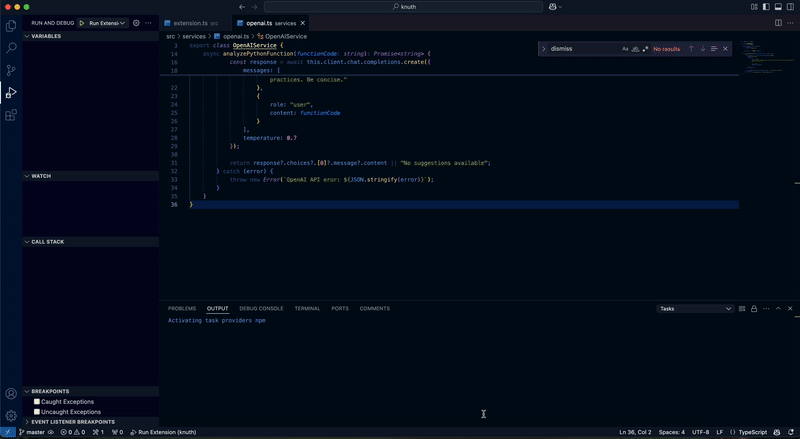Knuth AI: A Journey from Concept to Reality Check

The Birth of an Idea
After partially disabling GitHub Copilot and reflecting on the state of modern development tools, a question kept nagging at me: If my current approach to using Copilot didn't feel right, what would be the right way? How can we leverage AI to enhance our coding skills without diminishing our ability to think critically? These questions weren't just about finding alternatives – they were about reimagining how AI could support developers in their growth journey. This led to the conception of Knuth AI, named after Donald Knuth, the father of algorithmic analysis.
What is Knuth AI?
Knuth AI is an open source assistant. It represents a different approach to AI-assisted coding. Instead of generating code for you, it analyzes your code after you've written it, suggesting potential improvements and alternative implementations. Think of it as a mentor who watches you solve a problem and then discusses better approaches, rather than someone who solves the problem for you. You can see Knuth AI in action in this demo video.
The Core Philosophy
The fundamental difference between Knuth AI and traditional AI coding assistants lies in its philosophy. While tools like GitHub Copilot and Cursor IDE focus on code generation and completion, Knuth AI emphasizes code analysis and learning. The goal isn't to write code faster, but to write code better and understand why certain approaches are more effective than others.
The Technical Implementation
For the proof of concept (POC), I spent a few hours creating a quick implementation to visualize and test the concept. The goal was simple: create something tangible that would help me understand whether this approach was worth pursuing further. While my long-term vision included features like connecting to various LLMs, privacy first approach and comprehensive code analysis, the POC was intentionally minimal – just enough to get a feel for the practical challenges and potential impact.
Initially, I considered developing this as a VS Code extension, but given the exploratory nature of the project, I did not publish the extension. This quick exercise proved invaluable, as it helped surface important questions about user adoption and practical utility that might have taken longer to discover with a more complex implementation.
The Reality Check
However, the development journey led to some unexpected insights. While building the proof of concept, I began to question whether this approach would resonate with today's developers. In a world where speed and efficiency are often prioritized over deep understanding, would developers take the time to engage with a tool that asks them to slow down and think?
Discussions with fellow engineers revealed a sobering truth: while they appreciated the concept, they weren't sure they would use it regularly. This feedback highlighted a crucial challenge in the software development ecosystem, the need to be fast because that's the reality we live in – the tension between rapid development and deep understanding.
The Path Forward
This reality check doesn't necessarily mean the end of Knuth AI, but rather a moment for recalibration. The core idea – promoting thoughtful, algorithm-aware coding – remains valuable. The challenge now is finding the right format and approach that balances:
- The need for speed in modern development
- The importance of understanding algorithmic principles
- The practical constraints of daily coding work
- The desire for continuous learning and improvement
What I Learned
This journey with Knuth AI has taught me several valuable lessons about product development and the software engineering ecosystem:
- The gap between theoretical value and practical adoption can be significant
- Developer tools need to fit seamlessly into existing workflows
- Even the most well-intentioned ideas need to be validated against real-world user needs
- The challenge of promoting deeper learning in an environment that prioritizes immediate results
Looking Ahead
While the initial proof of concept might not have hit the mark exactly as intended, the experience has provided valuable insights for future iterations. The project remains open-source, and I'm continuing to explore ways to achieve its core mission: helping developers write better code through understanding, not just automation.
Perhaps the future of Knuth AI lies not in being a standalone tool, but in finding ways to integrate deeper learning and algorithmic thinking into the tools developers already use and love. The journey continues, and the lessons learned will inform whatever comes next.
Your Thoughts?
I'm curious to hear from other developers about this challenge. How do you balance the need for speed with the desire for deeper understanding? What kind of tools would help you become a better developer without slowing you down? The repository is open for contributions and discussions, and I welcome your insights as we explore this space together. Please feel free to reach out to me at hello@anfalmushtaq.com if you want to discuss this further or if you have felt this issue as well.
